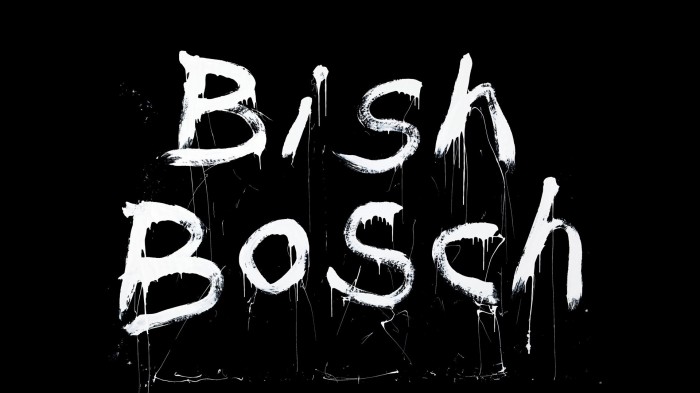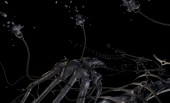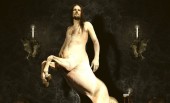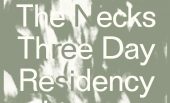Scott Walker’s metamorphosis from chart-bothering crooner into grizzled avant-gardist is one of the most remarkable turnarounds in modern music; Snoop Lion could rename himself Snoop Nightingale and start warbling operettas and it would only be slightly more surprising. If you’re familiar with Walker’s 2006 opus “The Drift”, you’ll know it’s possibly the most terrifying record released this century, a ball of harrowing strings, obfuscating lyrics and stomach-churning crescendos aided by the infamous use of a dead animal as a percussive instrument on ‘Clara’, a track about Benito Mussolini’s mistress.
Such a singular record is always going to be difficult to follow up, so what approach does Walker take on “Bish Bosch”? Well, largely, it’s more of the same. While opening track ‘See You Don’t Bump His Head’ does briefly feature an unexpectedly meaty metal riff on electric guitar, the defining characteristics are the high-pitched, dissonant strings and Walker’s mournful baritone uttering fantastically unsettling lyrics like, “While plucking feathers from a swan song / Spring might gently press its thumbs against your eyes”.
However, there’s a point during ‘Corps De Blah’, when the words “a sphincter’s tooting our tune” are accompanied by the sound of squeezed out farts, when you wonder whether Walker’s just taking the piss. As warped dogs bark, and horrendous noisy violins spew outwards like evil fireworks, you worry whether “Bish Bosch” is in danger of descending into parody. “Nothing clears a room like removing a brain,” he intones, although the chilling sound of a large knife slowly being sharpened puts this album a close second to amateur neurosurgery in the room-clearing stakes. Yet considering the subject matter, it all seems a little…predictable.
It’s when Walker departs from his usual tricks that your ears really prick up. Witness the brief samba breakdown during ‘Phrasing’, or the bass sax riff and subtle cowbell rhythms on ‘Epizootics!’, which is about as close as he’ll ever come to a funky groove. The ukelele coda to that track even sounds amusingly like Beirut, although preceeding lines like “Take that accidentally in the bollocks for a start” mean you’re never in danger of forgetting where you are.
The ridiculously-named ‘SDSS14+13B (Zercon, A Flagpole Sitter)’ forms the centrepiece of the album, which features some particularly vicious lyrical barbs during its twenty-plus minutes. “This is my job / I don’t come around and put out your red light when you work…If shit were music / you’d be a brass band,” are the words that open the track, with the vulgarity reaching an obscene peak with the line, “I’ve severed my reeking gonads / Fed them to your shrunken face”. Musically everything feels much deeper, grander and “Drift”-ier, and there’s even room for a beautiful bit of harmony about fifteen minutes in, although naturally it only lasts about thirty seconds and even then is distorted by what sounds like seventeen miniature horses clopping across it.
The best is perhaps saved for last. ‘The Day the “Conducator” Died (An Xmas Song)’ is a rare instance of Walker showing real restraint, seeing him wearily contemplate a banal personality quiz with resigned moroseness. It’s the only track where he plays all the instruments himself, and my, does he play them well. It’s not particularly Christmassy of course, save the odd sleigh bell and an absurd xylophone rendition of ‘Jingle Bells’ at the end, but it’s a surprisingly fitting and functional ending to a wilfully disjointed album.
That’s the thing. Although there are moments were you suspect Walker is just playing around, chaotically tossing depraved ideas about to see what he can get away with, it’s a blessing that he’s created a niche which gives him the freedom to do so. No one else could’ve made this record, or even come close. Like William Burroughs, he’s created a bizarre, disturbing world all of his own, and while you wouldn’t want to stay there (unless you’re some sort of psychopath) it’s a fascinating place to visit. “Bish Bosch” may be flawed, but it’s also awe-inspiring. And what would you rather, a flawed Scott Walker album or a flawless Kooks one? Exactly.






Follow us
Follow us on Facebook Follow us on Twitter Follow us on Google+ Subscribe our newsletter Add us to your feeds